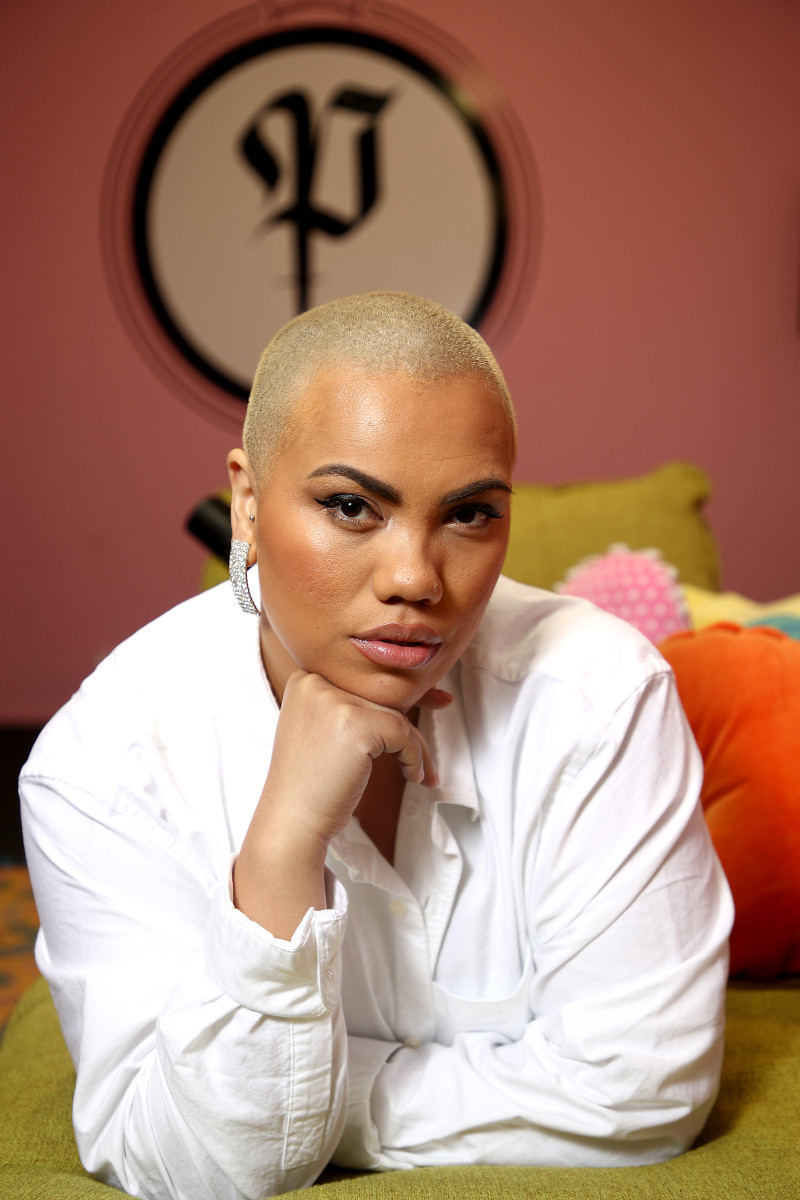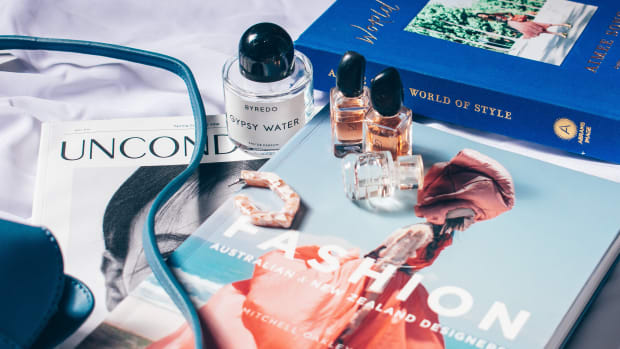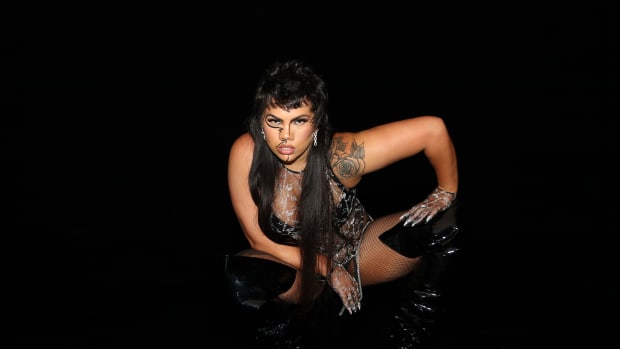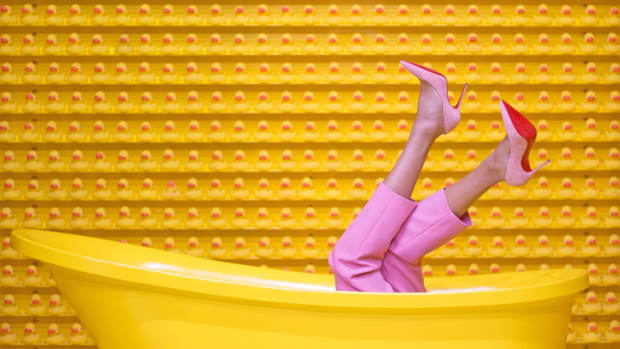In our long-running series "How I'm Making It," we talk to people making a living in the fashion and beauty industries about how they broke in and found success.
"I've always
been pretty confident in my dreams and where I see my future heading, so it didn't take me very long to identify what I wanted to be when I grew up."
Parris Goebel, the electrifying dancer and choreographer behind the Savage x Fenty shows and some of the most memorable music videos of the past decade (if you've recreated the moves from Justin Bieber's "Sorry" in your bedroom, you have her to credit), understood what she was meant to do at an early age, and she wasted no time in getting to work. That meant dedicating herself full-time to dance at 15, forming her own dance crew and posting her work on YouTube — all in her teens — before an artist by the name of Jennifer Lopez noticed her.
At 19, the New Zealander was booked to choreograph J.Lo's world tour, which opened the door to working with other artists, from Bieber to Rihanna. Those first big projects have turned into long-standing collaborations — so that, when Rihanna was assembling a team to bring her vision for Savage x Fenty to the runway, she called Goebel.
"The shows are really their own world. There's nothing else quite like it," she says. "It's cool for us to approach it every year and just be like, 'How can we outdo last year's show? How can we be fresh and innovative and cutting edge?'"
In addition to dance, Goebel is signed with IMG Models, and has starred in campaigns for global brands like Nike and Ugg. (She's currently the face of the latter's Spring 2022 rain collection.) She's also expanding the scope of her work behind the camera, into development and directing. Ahead, we talked to Goebel about her professional trajectory, what each project has taught her and what's next for her in the fashion space — and beyond.
At what point did you decide that you wanted to turn your love of dance into a career? What steps did you first take to make that happen?
From a really young age, I knew that I wanted to be a performer and be a dancer. I've always known that dance was something that I was passionate about and something that I was born to do. It was kind of hard for me because, growing up in New Zealand, I didn't have the resources to train or really work on my craft the way I wanted to — at least when I was younger, hip hop dance wasn't that big [there]. I just used what was around me: MTV and music videos. YouTube wasn't around back then. I would teach myself how to dance and how to make up moves and stuff.
I made the decision at 15, with my parents, to drop out of school, which I won't encourage everyone to do, but I think, in some cases, school isn't necessarily made for creatives, in a way where it nurtures and helps you grow your creative gifts and your artistic vision. I felt that school wasn't helping me in the way that I felt would help me achieve my dreams. So, I dropped out to pursue my dreams in dance. That was a big risk, but I actually feel it's one of the decisions that made me thrive at such a young age, because it gave me the opportunity to give it my all and put all my focus and time into this dream and into figuring out how I was going to get out of New Zealand, how was I going to get someone to see me all the way from New Zealand. The timing was perfect, because that's when YouTube came around.
I started kind of posting my work on YouTube. J.Lo was the first global artist that found me and booked me, at 19.
I mean, if the first person to call you up is J.Lo... Tell us more about that opportunity and how it changed the course of your career, not just in terms of opening professional doors, but also in the way you saw your career. Did it encourage you to take more risks, in that sense?
Absolutely. When you're on the other side of the world and when you're not in the scene where everything is happening, it's a very discouraging feeling. You think to yourself, 'Well, there are a million dancers. There are a million choreographers in America. Why would an artist choose me, all the way in New Zealand?' So for J.Lo to see me, me being so young and very inexperienced in the entertainment world, and be like, 'I could use anyone in the world to choreograph this, but I'm going to pick this girl from New Zealand' — that changed my whole perspective, of how I saw myself and how I saw the entertainment world. It really shows it doesn't matter where you are, how much money you have, how much experience you have: If you deserve the job or the shot or the break, it's going to happen for you.
I feel like I beat all odds and the stars aligned and shone on me. I had worked so hard up to that moment. I was ready for that moment. I was ready for that opportunity. When it fell into my hands, I was fearless with it. I didn't necessarily know the ins and outs of the industry — it was my first big job — but it didn't matter, because I had confidence in myself, because I worked so hard for that specific moment in my life.
At that point you had spent four years dedicating yourself exclusively to building your work. What were the most crucial building blocks so that, when you got that opportunity, you were able to kind of meet that moment?
In a lot of ways, I knew what I was doing, but there were so many parts of the job that I had never done before. Working with dancers that are much, much older than me, and I'm the one in charge — I was the youngest in the room, and yet I was telling them what to do and giving notes. That was a massive challenge for me, because for people to listen to you as a choreographer, you have to be respected. You have to be able to walk the walk, in a sense. You need to be able to show them how it's done and all these things. There are a lot of layers to the job, especially for me, at such a young age.
The speed was also a challenge. No one can prepare you for that. You could be given three songs in one day, and you have to choreograph that on the spot. Then, you're working with so many different people, in production and opinions... But I would say, because I dedicated every day of my life towards being a better dancer, being a better choreographer, being a leader — I had a studio by 17, so there was a lot of work I put in for me to just be confident in myself and confident in my vision. In those moments, even if I felt in some ways inadequate, my confidence always overtook that feeling of me not knowing what I'm doing. I'm just grateful for that. I do consider myself a very confident person when it comes to my heart, and I feel like I found that at a young age.
You've gone on to work on so many awesome projects. What would you say have been the skills that have best served you in terms of continuing to move forward and succeed?
I would definitely say just trusting myself. The trust in myself and the trust in my intuition has taken me to where I am today. There's so much noise in the world; when you can cancel all that out and trust what you think and what you feel, your taste and your eye and your flair, how you move and how you work, it silences the opinions of others.
I truly believe that uniqueness comes from when people are walking to their own beat, doing their own thing and not worrying about other people's validation. What you think of your style and of your own work is the most important opinion... You can respect [others'] opinions, but at the end of the day, it's what you think of yourself and your own work that matters. Once I learned that, it guided me through my career. Those moments when you're making a decision, whether it's within the art or who you're working with or saying yes or no to a job, they're very crucial. When you have a trust in yourself and your intuition, it guides you in a very fearless and unapologetic way. You come across so many different personalities and opinions, it sometimes can jade the way you see art or you see yourself — that's where we get lost. What's made me achieve everything that I've dreamed of is me just doing me and, to a degree, not caring what other people think.
What would you say have been the projects that have been your biggest career stepping stones in dance?
Recommended Articles
The obvious one is when I did the "Sorry" video by Justin Bieber. That definitely stands out. That catapulted me into a whole different world of opportunities and recognition because, not only did I choreograph it, but I creative directed it. That was a really cool moment for me.
It was really big, and I honestly wasn't ready for that. I didn't expect it. So that was really nice, to be able to just do something purely from your mind... and to see the world react like that and kind of obsess over it was really surprising — and, again, gave me a lot of confidence to continue my work on bigger scales and to push myself. Also, the simplicity of that video for me was like, 'Wow, I don't have to even do that much for people to really appreciate my work.' It was cool.
Then, the Savage x Fenty shows that I've done with Rihanna have presented my work in a whole new light, and have moved people around the world in a very deep and emotional way. The work we did with representation, body positivity and diversity on the show I think changed our culture, in a lot of ways — even how brands are moving now, how women are seeing themselves. It was so powerful, and I was really proud to be a part of that, for my art to help change how people view themselves.
Can you share a bit more about what you wanted to do with that choreography and how you envisioned it at the beginning, and then how working on these Savage x Fenty productions has impacted your career.
When we first started the shows, it was such unknown territory. We all had this innocence of like, 'What are we doing here?' It was cool because no one had really done it before, and we knew it was going to be powerful and game-changing... If you present me an opportunity like that, where you're telling me to do something no one's done before, that's really what excites me and gives me chills. Going from that to now doing last year's show, it's been such a journey and such a growth for us.
For me as an artist, the Savage x Fenty shows always push me creatively, mentally and emotionally, because I have to really dedicate myself as a woman and everything I feel about myself and about things in society that I don't agree with or that I'm passionate about changing — all those things, I take with me into the job. It's always a very emotional project for me, in a very self-empowering way.
Were you always interested in fashion? Was that something you hoped to do, marry your dance experience with fashion?
Ever since I was a little girl, I always had such a, should we say, passion for fashion. If anything, I've always been a little bit more eccentric in my taste. I would mismatch different things. I always had weird outfits, and my family would look at me like, 'What is she wearing?' That kind of thing when you're younger, I feel, turns into fashion when you're older, because when you're young, you're not afraid to try and wear different things, things that people think are weird. It goes into confidence and taste and an eye for fashion when you're older. There are so many aspects of fashion, but for me, what connects it to dance is that it's a part of the visual.
For me, as an artist, it's all about the visual. It's all about what people are seeing in front of them and how that makes them feel; what people are wearing is just as important as what they're doing with their bodies or what they're saying with the movement. It goes hand in hand, and I think it all affects how you feel. The color of their pants, the way the top falls, how skin-tight it is, how does that affect the choreography and the movement? When you're a true visionary, you care about all those things. There's not a single aspect I don't care about, from the music to the movement to the fashion to the hair and makeup. Everything matters to me. That's why I just authentically ended up in the fashion space.
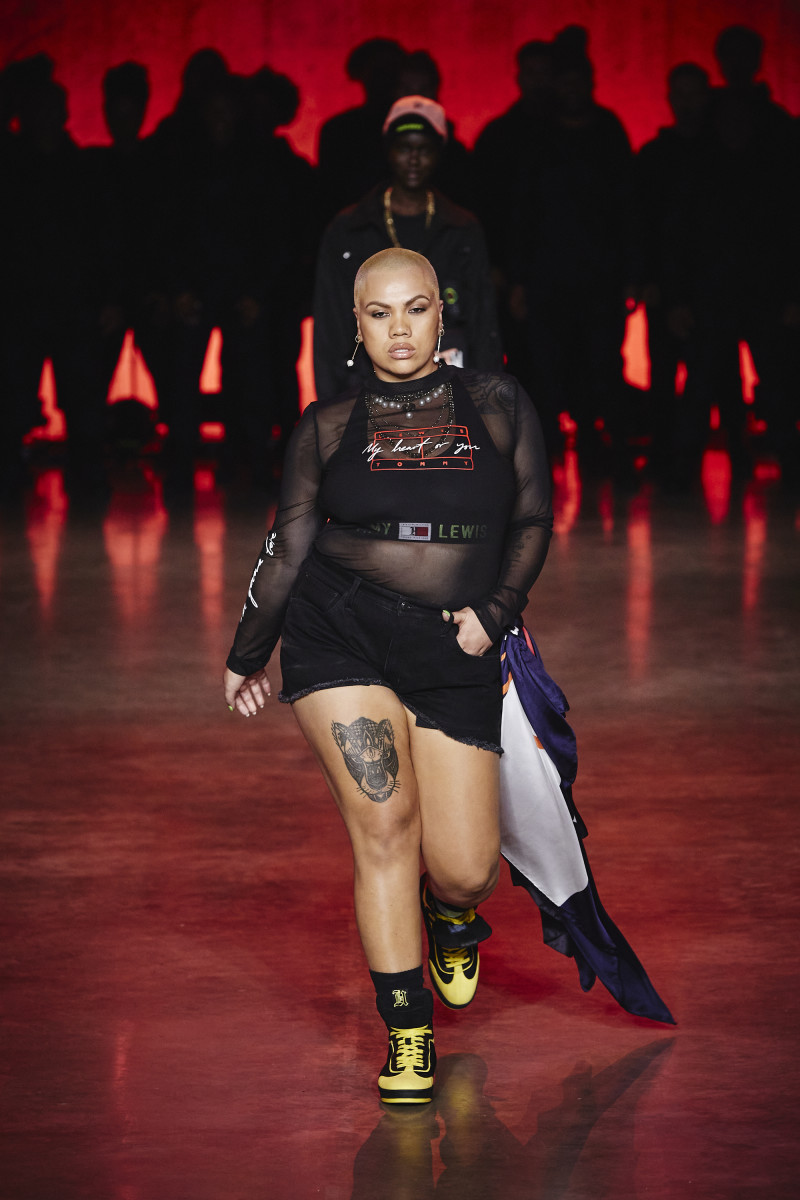
Goebel made her runway debut (outside of the Savage x Fenty productions) at Tommy Hilfiger's Spring 2020 fashion show during London Fashion Week in February 2020.
Photo: John Phillips/Getty Images for Tommy Hilfiger
In addition to choreographing and performing in the Savage x Fenty shows, you're signed with IMG Models. You've walked the runway and you've developed partnership with various brands. How do you see your work within the realm of fashion, and what are your ambitions in this space?
I'm just a vessel. I'm merely an instrument to represent other women like me. Being a curvy Polynesian woman from New Zealand that's beat all odds and now is the face of different brands and performing in different spaces, the more noise I can make, the more I can do my people proud and do other women like me proud. I'm more behind the scenes, so there was a point where I realized that there's other work that needs to be done, and that's me also being in front of the camera and representing.
As women, society has put so many restrictions on us, and I've spent years undoing and unprogramming all of that internally. I'm proud of the woman I am today. I'm proud that I'm multifaceted, that I'm in different spaces and killing it, that I'm creating my own world and that I can go from choreographing to directing to modeling. There's nothing I can't do. I truly believe that, and I feel like not enough women see that and believe that. That's the work I feel like I'm ready to do, to show that you can't put me in a box, you can't put women in a box. We can do it all.
Sometimes, that takes a lot of setting yourself free in order to do that as well... When you're used to just doing certain things, you have to sometimes step outside of that comfort zone and not be afraid to celebrate yourself, so that you can kind of show others that it can be done.
Now you're in a position where brands are approaching you. How do you decide who you want to work with?
When it comes to selecting brands or artists or specific jobs, I think and feel the same way every single time. First of all, am I a fan of this, or am I a fan of this person? Do I admire what they do? Do I actually wear that in my everyday life? It has to be very authentic to me as a person. Otherwise, it doesn't feel right. There's such an honesty to how I live my life and how I work, so I have to truly believe and stand for what the person or the brand stands for. And just overall, does this connect with me? Does this align with me?
Respect is a very big thing. When you start to engage with different brands or artists, you get a sense straight away if there's a respect for you and an appreciation for your work and your imagery and your voice. For me, always, that's key. Do I feel respected? Do I feel heard? That usually dictates whether I want to continue that relationship or not.
What's something that's exciting to you about the fashion industry right now?
I'm most excited about the changes and the evolution that's happening right now. Comparing the fashion space to 10 years ago, it's like night and day. There have been rules that have been broken down, people breaking the rules and making their own rules... All the tables are turning and people are now using their voices and standing up for things that maybe we weren't fighting as hard for a few years ago. There's just a spirit in the air where it's like, we don't really know where this is going, but we know things are changing. Now it's time for us to take our power back. The power's in the people's hands now. It's just an exciting time in general. We know things are changing, and the possibilities are endless.
This interview has been edited and condensed for clarity.
Never miss the latest fashion industry news. Sign up for the Fashionista daily newsletter.

